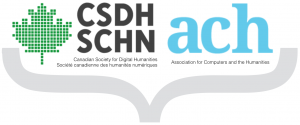GRAND-DH is the Digital Humanities project of the GRAND National Centre of Excellence.
This is a test to see that the blog aggregator is working.
tags: granddh
GRAND-DH is the Digital Humanities project of the GRAND National Centre of Excellence.
This is a test to see that the blog aggregator is working.
tags: granddh
 The inaugural joint conference of the Canadian DH society (CSDH/SCHN) and the ACH will take place in Ottawa from June 1-3, 2015. This will be an ideal venue for showcasing several projects from GRAND DigHum. Deadline for proposals is December 1st 2014. Full CFP below. Continue reading
The inaugural joint conference of the Canadian DH society (CSDH/SCHN) and the ACH will take place in Ottawa from June 1-3, 2015. This will be an ideal venue for showcasing several projects from GRAND DigHum. Deadline for proposals is December 1st 2014. Full CFP below. Continue reading
Ken Wissoker, Editorial Director of Duke University Press
Title: Writing and Publishing in a Time of Media Transformation
Date: Thursday, 16 October, 2014
Time: 1:00pm-2:30pm
Location: HC L-3, University of Alberta, Edmonton
*** Light reception to follow in HC 4-29, between Ken Wissoker’s talk and Sara Ahmed’s (in HC L-1 at 3:30).
Abstract: Taking research done for a thesis or for an audience of like-minded scholars and turning it into a book that will be read across oceans and disciplines has always been a challenge. Now, in a difficult financial climate for publishers and with electronic forms of the book proliferating, it is more difficult than ever. This talk will cover both the biggest issues — what might we expect books to look like in five years — and more grounded advice on how scholars should approach their own writing and publishing.
Bio: Ken Wissoker is the Editorial Director of Duke University Press, acquiring books in anthropology, cultural studies and social theory; globalization and post-colonial theory; Asian, African, and American studies; music, film and television; race, gender and sexuality; science studies; and other areas in the humanities, social sciences, media, and the arts. He joined the Press as an Acquisitions Editor in 1991; became Editor-in-Chief in 1997; and was named Editorial Director in 2005. Starting this fall, in addition to his duties at the Press, he will be Director of Intellectual Publics at the CUNY Graduate Center in New York City.
He has published close to 900 books which have won over 100 prizes. Among the authors whose books he has published are Eve Kosofsky Sedgwick, Jack Halberstam, Charles Taylor, Joan Scott, Lisa Lowe, Lauren Berlant, Brian Massumi, Arjun Appadurai, Sara Ahmed, Randy Weston, and Fred Wesley.
Wissoker is the author of the Cinema Journal essay “The Future of the Book as a Media Project and the earlier Chronicle of Higher Education articles “Scholarly Monographs Are Flourishing, Not Dying” and “Negotiating a Passage between Disciplinary Borders” the latter of which was later reprinted with responses from five social scientists in the Social Science Research Council newsletter, Items and Issues. A three-part interview with him by Adeline Koh appeared in April 2013 on the Prof. Hacker blog.
The GRAND Digital Humanities project welcomes Shuji Watanabe. He is an Associate Professor of Image Arts and Science visiting the University of Alberta from Ritsumeikan University, Kyoto, Japan. He is in Edmonton on sabbatical for 7 months with his family.
His research is around prototyping user generated content games. At the University of Alberta he is collaborating with GRAND researchers Geoffrey Rockwell and Jérémie Pelletier-Gagnon.
Professor Watanabe’s experience includes the planning and overseeing of various games such as Magic Pengel(/Garakuta Meisaku Gekijo Rakugaki Okoku)/, which was recommended by the Examination Committee at the 15th Media Arts Festival Media Art Interactive Division, and Minna no shiro, which won the Grand Prize at the First Annual Game Koshien Awards. He is an advocate of “ecological-sketch”, which visualizes rules and is a game design technique that begins from observations of the world as opposed
to imitating the works of others. He conducts research and development in not only traditional game development, but also in applicable fields such as education and crisis management appropriate for “gamification”. He is a member of the Research Committee, Japan Digital Game Association
and Steering Committee, Ritsumeikan Center of Game Studies.